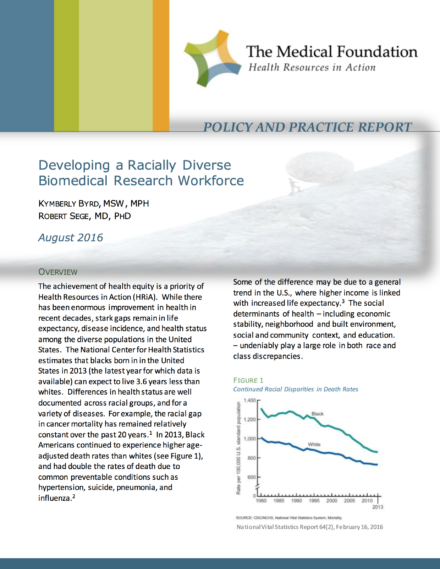
There are stark gaps in life expectancy, disease incidence, and health status among different racial and ethnic groups in the United States. While social determinants of health play an undeniably large role in both race and class discrepancies, HRiA’s new Policy & Practice Report explores another contributing factor. Developing a Racially Diverse Biomedical Research Workforce suggests that the ability of our research enterprise to improve our health remains substantially compromised by the relative racial and ethnic homogeneity of our current research workforce.
Diversity in scientific research benefits the workforce and society at large. Diverse teams generally outperform homogeneous teams, particularly those attempting to solve complex problems. Researchers from diverse backgrounds are also more likely to explore topics that are overlooked, thereby broadening the scope of biomedical research.
An Absence of Opportunity
Often resource-deprived neighborhoods adjoin large academic health care centers. Schools in these neighborhoods are frequently ill equipped to provide sufficient opportunities for students to pursue careers in science. Young people of color may have little personal exposure to researchers, and lack role models who may expose them to research careers
Solutions will require long term investments in helping young people from under-resourced communities succeed – beginning in secondary schools.
Initiatives in Greater Boston
For this brief, HRiA reviewed 20 programs in the region that aim to engage underrepresented minority students in the sciences. Learn more about these programs. HRiA’s Leaders in Education, Action and Hope project trains low-income high school students in the Boston Public Schools as mentors to increase interest in the sciences, and offer job readiness skills to high school mentors while inspiring low-income elementary students to succeed academically and develop their interests in science.
Download Report
Developing a Racially Diverse Biomedical Research Workforce

